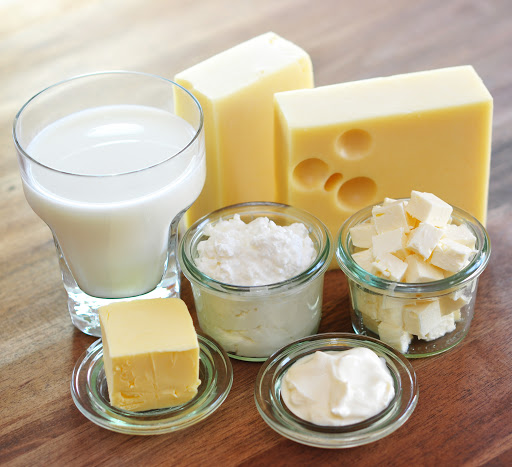Casein intolerance
Casein intolerance
Casein is a protein found in milk and other dairy products. A casein allergy occurs when your body mistakenly identifies casein as a threat to your body. Your body then triggers a reaction in an attempt to fight it off.
- Symptoms
- Causes
- Treatments
Symptoms
People with casein intolerance may experience a range of symptoms after consuming foods or beverages containing casein. These symptoms can vary in severity and may include:
- Digestive discomfort (e.g., bloating, gas, abdominal pain, diarrhea)
- Nausea or vomiting
- Skin rashes or hives
- Respiratory issues (e.g., coughing, wheezing)
- Behavioral changes (e.g., irritability, mood swings)
- Fatigue or lethargy
Diagnosis
Diagnosing casein food intolerance often involves a process of elimination. Your veterinarian may recommend a dietary trial, during which your dog is fed a novel or hydrolyzed protein diet that contains protein sources your dog hasn’t been exposed to before. If symptoms improve on the new diet and return when the old diet is reintroduced, it suggests a food intolerance.
causes
Casein intolerance, also known as lactose-free milk protein intolerance, is a condition characterized by difficulty digesting casein, a protein found in milk and dairy products. While the exact causes of casein intolerance are not fully understood, several factors may contribute to its development:
Genetics: Like many other food intolerances and allergies, genetics may play a role in predisposing individuals to casein intolerance. Some people may inherit genetic variations that affect their ability to digest and tolerate casein proteins effectively.
Immune System Response: In some cases, casein intolerance may involve an immune system reaction to casein proteins. Although not as severe as in autoimmune conditions like celiac disease, the immune system may still recognize casein as a foreign invader and mount a response, leading to inflammation and digestive symptoms.
Gut Health: Disruptions in gut health, such as leaky gut syndrome or dysbiosis (imbalances in the gut microbiota), may contribute to the development of casein intolerance. These conditions can impair the intestinal barrier function and affect the body’s ability to properly process and tolerate casein proteins.
Underlying Digestive Conditions: Individuals with underlying digestive conditions, such as irritable bowel syndrome (IBS), inflammatory bowel disease (IBD), or gastroesophageal reflux disease (GERD), may be more prone to developing casein intolerance. These conditions can affect digestive function and increase sensitivity to certain dietary proteins, including casein.
Enzyme Deficiencies: In some cases, deficiencies in enzymes responsible for breaking down casein proteins may contribute to casein intolerance. For example, lactase deficiency, which impairs the digestion of lactose (milk sugar), may lead to secondary intolerance to casein due to insufficient breakdown of lactose-containing dairy products.
Environmental Factors: Environmental factors such as stress, infections, and dietary changes may exacerbate or trigger symptoms of casein intolerance in susceptible individuals. These factors can impact gut health, immune function, and overall digestive function, making individuals more sensitive to dietary proteins like casein.
It’s essential to note that casein intolerance is a complex condition with individual variations, and what triggers symptoms in one person may not affect another in the same way. If you suspect you have casein intolerance, it’s important to consult with a healthcare professional for proper evaluation, diagnosis, and management. They can help determine the underlying causes of your symptoms and provide guidance on dietary modifications and treatment options.
treatments
Avoid food containing Casein
The primary treatment for casein intolerance involves avoiding or limiting the consumption of foods and beverages containing casein. This often requires careful reading of food labels and choosing alternative dairy-free or lactose-free products. Common sources of casein include milk, cheese, yogurt, butter, and many processed foods.
- All forms of milk
- Butter, margarine and
- Yogurt
- Cheese
- Ice cream,
- Cream
- Pudding, custard

Casein can also be in other foods and products that contain milk or milk powder, such as crackers and cookies. Casein can also be found in less obvious foods, such as nondairy creamers and flavorings. This makes casein one of the more difficult allergens to avoid.
This means it’s very important for you to read food labels carefully and ask what’s in certain foods before buying or eating it. At restaurants, make sure you alert your server about your casein allergy before ordering food.
You should avoid products that contain milk or may have been exposed to foods containing milk if you or your child has a casein allergy. A food’s ingredients list will state this.
Additionally, some food packaging may voluntarily list statements such as “may contain milk” or “made in a facility with milk.” You should avoid these foods as well because they may contain traces of casein.
Enzyme supplementation
Enzyme dietary supplements offer several potential benefits for individuals with various digestive issues or those seeking to improve their overall digestive health.
1. Support for Food Sensitivities and Intolerances
For individuals with food sensitivities or intolerances, enzyme supplements can help break down problematic components of their diet, such as lactose, gluten, or certain proteins. This can reduce the likelihood of adverse reactions and enable individuals to enjoy a wider range of foods without discomfort.

2. Alleviation of Digestive Discomfort
Enzyme supplements may help alleviate common digestive discomforts such as bloating, gas, abdominal cramps, and diarrhea by assisting in the breakdown of food molecules. This can lead to improved gastrointestinal comfort and a reduction in symptoms associated with irritable bowel syndrome (IBS) and other digestive disorders.
3. Enhanced Digestion
Enzyme supplements can aid in the breakdown of proteins, carbohydrates, fats, and other nutrients in the diet, facilitating more efficient digestion. This can help reduce symptoms such as bloating, gas, and indigestion, particularly in individuals with digestive disorders or insufficient enzyme production.
4. Improved Nutrient Absorption
By enhancing digestion, enzyme supplements can promote better absorption of essential nutrients from food. This is especially beneficial for individuals with malabsorption issues or those following restrictive diets that may lead to nutrient deficiencies. Better nutrient absorption supports overall health and well-being.
5. Assistance with Enzyme Deficiencies
In some cases, individuals may have enzyme deficiencies due to genetic factors or health conditions that affect enzyme production. Enzyme supplements can provide the specific enzymes needed to address these deficiencies, supporting optimal digestion and nutrient absorption.
